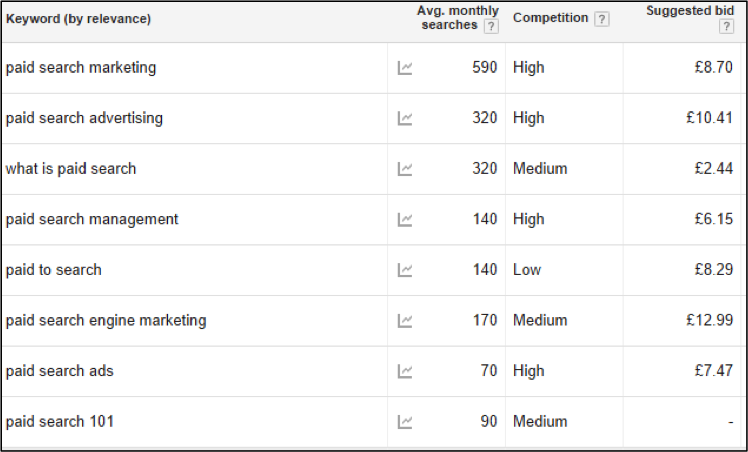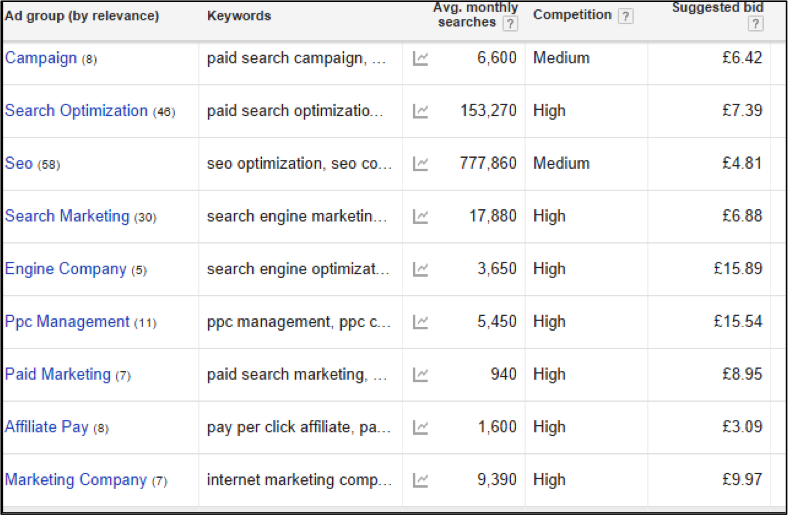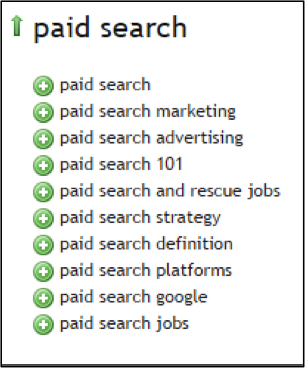Keywords are the fundamental building blocks of any paid search account. When you first launch a PPC account you will always have a list of keywords. It is crucial that you continue to find and develop new keywords so your account can grow and maximize impressions.
There are 2 approaches to keyword development: 1) Proactive 2) Reactive. Whilst we would all love to be proactive all of the time, being reactive is also necessary in order to understand the marketplace and make adjustments accordingly.
Let’s consider the tools you can use for both strategies.
Be Proactive
Keyword Planner
The Keyword Planner is a free AdWords tool that allows you to search keyword and ad group ideas. You can provide it with any of the following information and Google will recommend ideas:
- Product
- Service
- Landing Page
- Product Category
For example if I input that my service is “paid search” Google provides me with a list of keyword ideas sorted by relevance.
This tool could provide you with a different angle that you might not have considered. For example, you might not have thought of combinations that included the term “what,” even though “what is paid search” is the 3rd highest monthly search term in the UK. However, make sure to always keep in mind user search intent as you research new keywords.
As well as providing keyword ideas this tool will also provide new ad group suggestions. Using the same example Google provides me with similar ways, users might be searching for the services I am offering.
This information could inspire you to expand your ad group coverage. I recommend using this tool before creating an AdWords campaign as well as during.
Ubersuggest
Ubersuggest is another free tool that scrapes Google to provide you with all the top suggestions. You type a keyword and Ubersuggest will provide you with search suggestions organized by letter of the alphabet. You’ll find longer tail search queries based upon your generic terms, but the tool is also useful for identifying negative keywords. For example if you are advertising on the term “paid search” we see that one of the top triggered terms is “paid search and rescue jobs.” Our service is not related so negative keywords such as “rescue” and “jobs” would need to be implemented.
Your Website
Don’t overlook your website for keyword inspiration. Have a look at the copy that accompanies your products and services. There may be different words used to describe products and services that you may have overlooked. For example, if you run a clothing store, use the product descriptions to formulate your keywords. They might refer to red as burgundy so you’ll want to make sure you have both terms in your account.
Competitor Websites
You may only think of paid search as paid search but a visit to a competitor website might describe the service in a different way. For example, you may talk about paid search and PPC on your website, however a competitors website may refer to this service as SEM (Search Engine Marketing). Having visited this site you may then add keywords to your campaign around search engine marketing to gain additional traffic for the same service.
Thesaurus
Don’t forget the good old-fashioned thesaurus. It is a brilliant tool to help you identify other ways people might search for the service or product you are promoting. The thesaurus is particularly useful if the area you are researching is alien to you. You might not realize people also refer to something as something else!
Be Reactive
Search Query Reports
Search Query Reports (SQRs) should be commonplace when running PPC accounts. I recommend using this report almost daily (you have a time lag to see this data) when you first launch an account. Once some time as passed you can reduce the frequency of checking and updating this report, but you should still check regularly. You can see this report for all keywords at once, all keywords in a campaign, in an ad group or just the individual keyword. It’s best to review all instances.
I like to think of the SQR report as purgatory. You have a list of keywords that you want to either add into your campaign or exclude. You don’t want to leave keywords in limbo in the SQR report. If you do leave your keywords in “purgatory” within the SQR you cannot effectively manage them. You want to add these terms into the account so you can actively manage the bids and ensure maximum efficiency.
Finally, consider the match types you are using. If you are using broad match you are going to be open to a crazy range of search queries. It could mean your strategy is a lot more labor intensive and reactive. Consider using more specific match types such as phrase and exact match to limit your exposure to a relevant audience. You can then widen your reach to utilize broad match modifier once you feel confident an area is performing well.
The key takeaway is to ensure your account is continuously dynamic. The keywords you have in your account today should continually be expanding and growing.
If you have any comments or any other tips to share please leave them in the comments section below.






